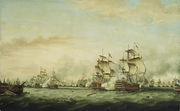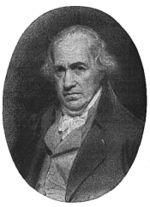1782
| Millennium: | 2nd millennium |
|---|---|
| Centuries: | 17th century – 18th century – 19th century |
| Decades: | 1750s 1760s 1770s – 1780s – 1790s 1800s 1810s |
| Years: | 1779 1780 1781 – 1782 – 1783 1784 1785 |
| 1782 in topic: |
| Subjects: Archaeology – Architecture – |
| Art – Literature (Poetry) – Music – Science |
| Countries: |
| Leaders: State leaders – Colonial governors |
| Category: Establishments – Disestablishments |
| Births – Deaths – Works |
Year 1782 (MDCCLXXXII) was a common year starting on Tuesday (link will display the full calendar) of the Gregorian calendar (or a common year starting on Saturday of the 11-day slower Julian calendar).
Contents |
Events of 1782
February 5: Gnadenhutten massacre.
January–June
- January 7 – The first American commercial bank (Bank of North America) opens.
- January 15 – Superintendent of Finance Robert Morris goes before the U.S. Congress to recommend establishment of a national mint and decimal coinage.
- January 23 – Laird of Johnstone, George Ludovic Houston invites people to buy marked plots of land, when builtupon, form the planned town of Johnstone, Scotland, to provide employment for his thread and cotton mills.
- February 5
- The Spanish defeat British forces and capture Minorca.
- In Ohio, the Gnadenhutten massacre of Native Americans takes place in which 29 men, 27 women, and 34 children are killed by white militiamen in retaliation for raids carried out by another Native American group.
- March 27 – Charles Watson-Wentworth, 2nd Marquess of Rockingham becomes Prime Minister of the United Kingdom.
- March 31 – Mission San Buenaventura was founded on Easter Sunday in Las Californias, part of the Spanish Viceroyalty of New Spain.
- April 6 – Rama I succeeds King Taksin of Siam, who was overthrown in an coup d'etat; moves capital to Bangkok.
- April 12 – Battle of the Saintes: A British fleet under Admiral Sir George Rodney defeats a French fleet under the Comte de Grasse in the West Indies.

April 12: Battle of the Saintes.
- June 18 – In Switzerland, Anna Göldi is sentenced to death for witchcraft (the last legal witchcraft sentence).
- June 20 – The bald eagle is chosen as the emblem of the United States of America.
July–December
- July – Joseph II, Holy Roman Emperor, receives a visit from Pope Pius VI.
- July 1 – American privateers attack Lunenburg, Nova Scotia.
- August 7 – George Washington orders the creation of the Badge of Military Merit (or the Order of the Purple Heart) to honor soldiers' merit in battle (reinstated later by Franklin D. Roosevelt and renamed to the more poetic "Purple Heart" to honor soldiers wounded in action).

Watt's steam engine patent renewed.
- November 30 – American Revolutionary War: In Paris, representatives from the United States and the Kingdom of Great Britain sign preliminary peace articles (later formalized in the Treaty of Paris).
Undated
- London creates the Foot Patrol for public security.
- In the summer of 1782 the Dutch banker Nicolaas van Staphorst leads discussions with John Adams over a loan to the United States of five million guilder, at that time a considerable sum.
- The British parliament extends James Watt's patent for the steam engine to the year 1800.
- The North Carolina General Assembly incorporates Washington, North Carolina.
- In China, the Siku Quanshu is completed, the largest literary compilation in China's history (surpassing the Yongle Encyclopedia of the 15th century). The books are bound in 36,381 volumes (册) with more than 79,000 chapters (卷), comprising about 2.3 million pages, and approximately 800 million Chinese characters.
- Chief Kamehameha I of Hawaii gains control of the northern part of the island of Hawaii after defeating his cousin Kiwala'o.
- Saint Petersburg has 300,000 inhabitants.
Births
| Gregorian calendar | 1782 MDCCLXXXII |
| Ab urbe condita | 2535 |
| Armenian calendar | 1231 ԹՎ ՌՄԼԱ |
| Bahá'í calendar | -62 – -61 |
| Bengali calendar | 1189 |
| Berber calendar | 2732 |
| Buddhist calendar | 2326 |
| Burmese calendar | 1144 |
| Byzantine calendar | 7290 – 7291 |
| Chinese calendar | 辛丑年十一月十八日 (4418/4478-11-18) — to —
壬寅年十一月廿七日(4419/4479-11-27) |
| Coptic calendar | 1498 – 1499 |
| Ethiopian calendar | 1774 – 1775 |
| Hebrew calendar | 5542 – 5543 |
| Hindu calendars | |
| - Bikram Samwat | 1838 – 1839 |
| - Shaka Samvat | 1704 – 1705 |
| - Kali Yuga | 4883 – 4884 |
| Holocene calendar | 11782 |
| Iranian calendar | 1160 – 1161 |
| Islamic calendar | 1196 – 1197 |
| Japanese calendar | Tenmei 2 (天明2年) |
| Korean calendar | 4115 |
| Thai solar calendar | 2325 |
- January 5 – Robert Morrison, Scottish Protestant missionary to China (d. 1834)
- January 18 – Daniel Webster, American statesman (d. 1852)
- March 4 – Johann Rudolf Wyss, Swiss writer (d. 1830)
- March 13 – Sir Robert Bateson, 1st Baronet, Irish nobility
- March 18 – John C. Calhoun, 7th Vice President of the United States (d. 1850)
- July 3 – Pierre Berthier, French geologist (d. 1861)
- July 26 – John Field, Irish composer (d. 1837)
- October 27 – Nicolò Paganini, Italian violinist and composer (d. 1840)
- November 1 – Frederick John Robinson, 1st Viscount Goderich, Prime Minister of the United Kingdom (d. 1859)
- December 5 – Martin Van Buren, 8th President of the United States (d. 1862)
- date unknown
Deaths
- January 2 – Johann Christian Bach, German composer (b. 1735)
- January 4 – Ange-Jacques Gabriel, French architect (b. 1698)
- February 9 – Joseph Aloysius Assemani, Syrian orientalist (b. 1710)
- February 11 – Friedrich Christoph Oetinger, German theologian (b. 1702)
- March 12 – Daniel Bernoulli, Dutch-born mathematical physicist (b. 1700)
- April 13 – Metastasio, Italian poet and librettist (b. 1698)
- April 28 – William Talbot, 1st Earl Talbot, English politician (b. 1710)
- May 15 – Marquis of Pombal, Portuguese prime minister (b. 1699)
- May 16 – Daniel Solander, Swedish botanist (b. 1736)
- May 20 – William Emerson, English mathematician (b. 1701)
- May – Richard Wilson, Welsh painter (b. 1714)
- June 18 – John Wood, the Younger, English architect (b. 1728)
- July 1 – Charles Watson-Wentworth, 2nd Marquess of Rockingham, Prime Minister of the United Kingdom (b. 1730)
- July 15 – Farinelli, Italian castrato (b. 1705)
- August 31 – George Croghan, American colonist
- December – Hyder Ali, Indian general and Sultan of Mysore
- December – Jean Jacques Rousseau, French Philiosopher and Jacobin
- December 27 – Henry Home, Lord Kames, Scottish advocate and philosopher (b. 1697)